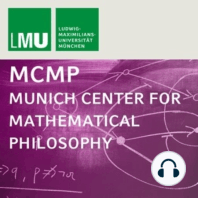92 min listen

Recent metamathematical wonders and the question of arithmetical realism
Recent metamathematical wonders and the question of arithmetical realism
ratings:
Length:
62 minutes
Released:
Apr 18, 2019
Format:
Podcast episode
Description
Andrey Bovykin (Bristol) gives a talk at the MCMP Colloquium (16 January, 2013) titled "Recent metamathematical wonders and the question of arithmetical realism". Abstract: Metamathematics is the study of what is possible or impossible in mathematics, the study of unprovability, limitations of methods, algorithmic undecidability and "truth". I would like to make my talk very historical and educational and will start with pre-Godelean metamathematics and the first few metamathematical scenarios that emerged in the 19th century ("Parallel Worlds", "Insufficient Instruments", "Absence of a Uniform Solution", and "Needed Objects Are Yet Absent"). I will also mention some metamathematical premonitions from the era before Gauss that are the early historical hints that a mathematical question may lead to a metamathematical answer, rather than a "yes" or "no" answer. (These historical quotations have recently been sent to me by a historian Davide Crippa.) Then I am planning to sketch the history and evolution of post-Godelean metamathematical ideas, or, rather, generations of ideas. I split post-Godelean history of ideas into five generations and explain what people of each generation believed in (what are the right objects of study? what are the right questions? what are the right methods?). The most spectacular, and so far, the most important completed period in the history of metamathematics started in 1976 with the introduction of the Indicator Method by Jeff Paris and the working formulation of the Reverse Mathematics Programme by Harvey Friedman. I will describe this period (what people believed in that era) in some detail. We now live in a new period in metamathematics, quite distinct from the ideas of 1980s. I will speak about the question of universality of Friedman's machinery, the theory of templates, meaninglessnessisation (with an entertaining example of eaninglessnessisation), Weiermann's threshold theory and some new thoughts about the space of all possible strong theories. I will concentrate in most detail on the question of the Search for Arithmetical Splitting (the search for "equally good" arithmetical theories that contradict each other). and sketch some possible ways that may lead to the discovery of Arithmetical Splitting. There are people, who strongly deny the possibility of Arithmetical Splitting, most often under the auspices of arithmetical realism: "there exists the true standard model of arithmetic". They usually cite Godel's theorem as existence of ***true*** but unprovable assertions and concede only to some epistemological difficulties in reaching the "arithmetical truth". I will mention seven common arguments usually quoted by anti-Arithmetical-Splitting people and explain why it seems that all of these arguments don't stand. Historically and very tentatively, I would like to suggest that anti-Arithmetical-Splitting views should perhaps be considered not a viable anti-Pluralist philosophy of mathematics, but rather a conservative resistance to the inevitable new generation of metamathematical wonders. So anti-Arithmetical-Splitting views are more in line with such historical movements as "rejection of complex numbers", "resistance to non-Euclidean geometries in 1830s-1850s", and "refusal to accept concepts of abstract mathematics in the second half of the 19th century" and other conservative movements of the past. Arithmetical Splitting has not been reached yet, but we are well equipped to discuss it before its arrival.
Released:
Apr 18, 2019
Format:
Podcast episode
Titles in the series (22)
Remarks on the foundations of mathematics: Colloquium Mathematical Philosophy by MCMP – Philosophy of Mathematics